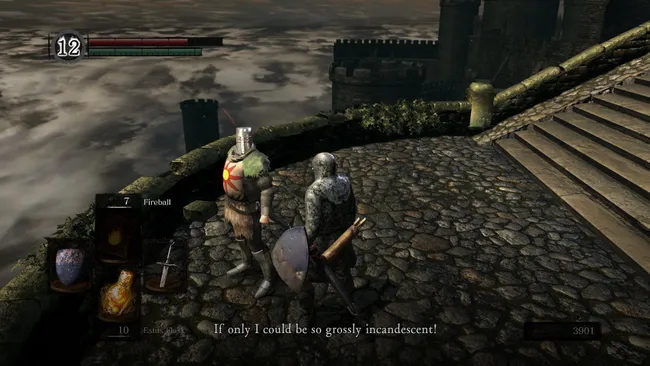The Toxicity of the Dark Souls Community: What's Behind It?

The Dark Souls series, developed by FromSoftware, is notorious for its brutal difficulty and unique gameplay. Over the years, the game has amassed a large, dedicated fanbase, but with this has also come a reputation for toxicity. Many players describe the Dark Souls community as harsh, unforgiving, and even hostile toward newcomers. In this blog post, we’ll explore what’s behind the toxicity in the Dark Souls community and discuss how this environment has evolved.
1. The Myth of the Dark Souls Community
The Dark Souls community is a complex entity, much like the game itself. For many, the community is a tight-knit group of passionate players who enjoy the game’s brutal difficulty and intricate lore. However, there's another side to this fanbase: a subset known for gatekeeping, elitism, and unwelcoming attitudes. Players often discuss these behaviors in various online spaces, where users recount their experiences with community toxicity.
2. The Game's Core Design: Brutal Difficulty and Elitism
Dark Souls is designed to be unforgiving. Its difficulty is a fundamental part of the gameplay experience, and for many, overcoming these challenges becomes a point of pride. However, this sense of accomplishment can foster elitism. Experienced players often adopt a "git gud" mentality, a phrase frequently used to dismiss the struggles of less experienced players. In online communities like Reddit, some players use this phrase to mock or belittle others.
3. Anonymity in Online Interactions
The anonymity of online platforms often leads to harsher interactions. Reddit, forums, and even in-game messaging systems allow users to interact without accountability. This anonymity often emboldens individuals to be more toxic than they would be in face-to-face interactions. A quick look at any Dark Souls subreddit reveals threads filled with arguments, insults, and harsh criticism, where players aggressively critique newcomers' gameplay styles.
4. The PvP Culture in Dark Souls
Player vs. Player (PvP) combat is a significant part of the Dark Souls experience, but it’s also a breeding ground for toxicity. PvP is often filled with "ganking" (ganging up on lone players) and other unfair tactics that can create a toxic atmosphere. Players who lose in PvP often vent their frustrations in online forums, turning the competitive nature of the game into personal attacks. Reddit is full of examples of players calling each other out for "cheap tactics" or unsportsmanlike behavior.
5. Gatekeeping and Exclusion of Newcomers
Gatekeeping is one of the most prominent toxic behaviors in the Dark Souls community. Veteran players sometimes dismiss the experiences or opinions of newcomers, deeming them unworthy of participating in discussions unless they’ve “earned” the right. Where newer players share their frustrations about feeling unwelcome. Terms like "casual" are often weaponized to belittle those who are still learning the ropes.
6. Toxic Memes and Community In-Jokes
Memes and in-jokes are common in the Dark Souls community, with the "git gud" phrase being the most notorious. While these jokes can be funny, they often contribute to a toxic culture that excludes or mocks players who are struggling. Influencers and content creators sometimes amplify these memes, making them more widespread.
7. Difficulty as a Badge of Honor
For many players, completing Dark Souls is seen as a badge of honor. The sense of accomplishment that comes with conquering a notoriously difficult game can create a feeling of superiority. Unfortunately, this often translates into a condescending attitude toward players who use alternative strategies, such as co-op assistance or specific character builds.
8. The Role of Influencers and Content Creators
Influencers and content creators play a significant role in shaping the Dark Souls community. Some content creators promote an aggressive, competitive playstyle, which can inadvertently encourage toxic behavior. While many streamers foster positive, inclusive spaces, others contribute to the toxicity by emphasizing elitism and mocking less experienced players.
9. The Psychological Aspect: Frustration and Catharsis
Playing Dark Souls can be emotionally exhausting. The game’s difficulty often leads to frustration, and players may vent this frustration through toxic behavior, both in-game and online. This is a common theme in discussions where players talk about how the game can bring out their worst tendencies. For some, this venting becomes a form of catharsis, but it ultimately harms the broader community by fostering negativity.
10. Conclusion: Can the Dark Souls Community Change?
While the Dark Souls community has its toxic elements, it’s not beyond redemption. Many players and influencers are working to foster more inclusive and positive spaces, where newcomers and veterans alike can enjoy the game. To create a healthier community, players need to hold themselves accountable and celebrate diverse playstyles rather than gatekeeping or mocking others. By promoting positive interactions and valuing every player's experience, the Dark Souls community can evolve into a more welcoming and less toxic space.
---
In conclusion, the toxicity within the Dark Souls community has multiple layers, from elitism to anonymity and frustration. However, with conscious effort from players and influencers, this environment can improve. If you're part of the community and want to see a change, consider engaging in constructive conversations and supporting newcomers. Let's make the Dark Souls community one that upholds the challenge of the game without turning it into a toxic experience for those who play.